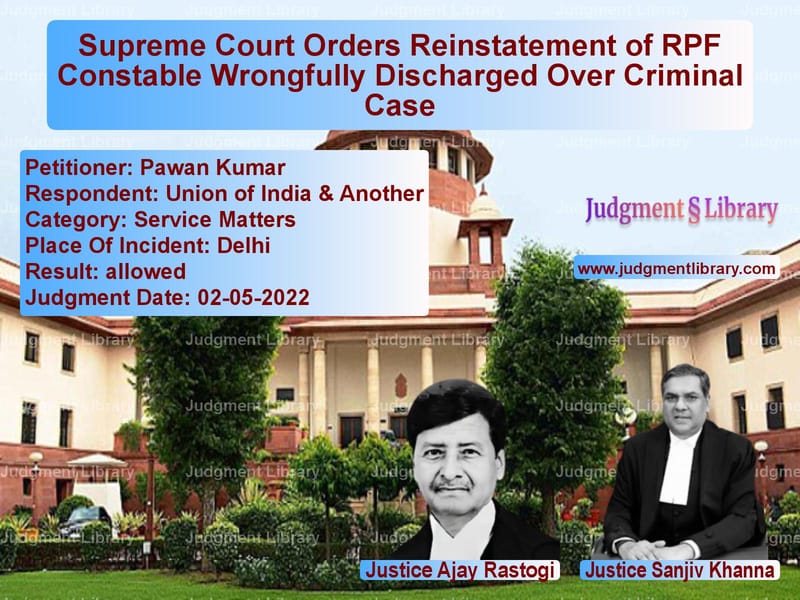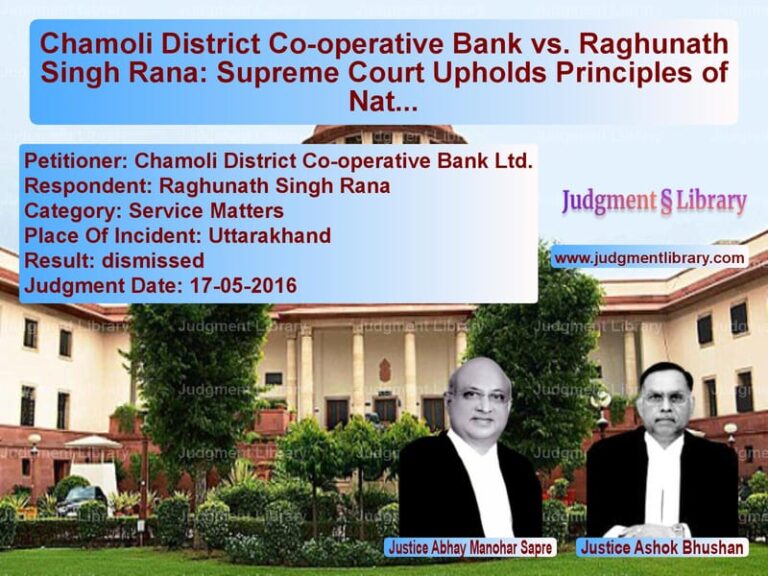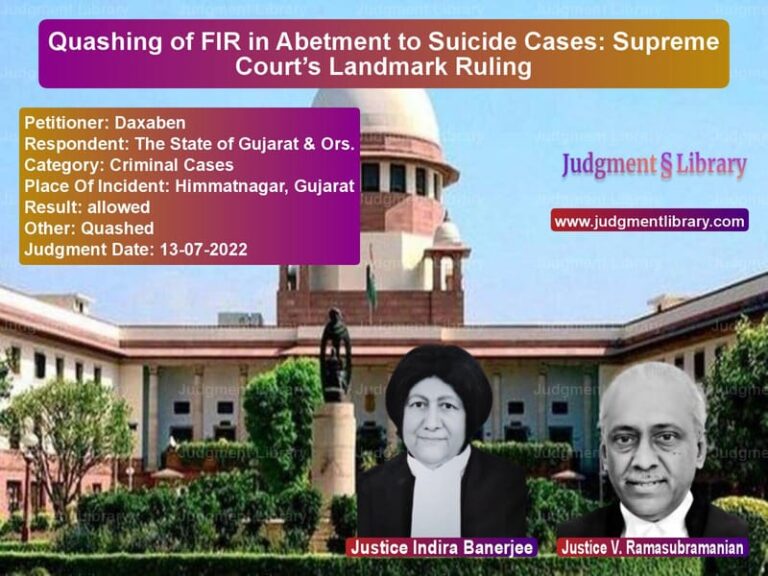Supreme Court Orders Reinstatement of RPF Constable Wrongfully Discharged Over Criminal Case
The Supreme Court of India recently ruled in favor of Pawan Kumar, a candidate selected for the position of Constable in the Railway Protection Force (RPF), who was discharged from service over alleged suppression of a criminal case in his verification form. The case, Pawan Kumar vs. Union of India, revolved around the procedural fairness of dismissing an employee over a past criminal case that resulted in acquittal.
Background of the Case
The dispute arose when Pawan Kumar, after successfully clearing all stages of recruitment for the RPF, was discharged from service on 24 April 2015 based on the grounds that he had failed to disclose a previous criminal case in his attestation form. The criminal case, which had been registered against him in April 2011, resulted in his acquittal on 12 August 2011. However, the authorities contended that his failure to mention the case amounted to suppression of material information.
The sequence of events is as follows:
- 2011: Pawan Kumar applied for the position of Constable in the RPF.
- April 2011: A false criminal case was registered against him.
- August 2011: He was acquitted of all charges.
- 2013-2014: He cleared the selection process, including a physical efficiency test.
- May 2014: He submitted an attestation form, wherein he marked ‘No’ in response to whether he had ever been arrested or prosecuted.
- April 2015: He was discharged from service for suppression of material facts.
- 2015: The Delhi High Court upheld the discharge.
- 2022: The Supreme Court overruled the High Court’s decision and ordered reinstatement.
Key Legal Issues
- Whether the failure to disclose a past criminal case (which ended in acquittal) amounts to suppression of material facts.
- Whether a past criminal case, particularly one leading to acquittal, can be used to disqualify a candidate from public employment.
- Whether the decision of the RPF authorities in discharging the petitioner was fair and proportionate.
Arguments by the Petitioner (Pawan Kumar)
The petitioner contended that:
- At the time of filling his employment form, he had no criminal case against him.
- The criminal case was false, and he was acquitted by the court.
- The dismissal was excessive, especially given that the case did not involve moral turpitude.
- The authorities did not consider the nature of the offense or his acquittal.
- The Avtar Singh vs. Union of India ruling by the Supreme Court allows for a balanced approach in such matters.
Counterarguments by the Respondent (Union of India)
The government contended that:
- Applicants for security-sensitive positions such as the RPF must disclose all past criminal records.
- By failing to mention the case, the petitioner misrepresented himself.
- As per Rule 67.2 of the RPF Rules, candidates with adverse antecedents may not be appointed.
- Honest disclosure was essential for public confidence in law enforcement services.
Supreme Court’s Observations
1. Failure to Disclose Must Be Considered in Context
“Indisputedly, on the date when the application form was filled by the appellant, no such criminal case was either instituted or pending against him, and what was disclosed by him at the time of filling his application form was not suppression of relevant information.”
The Court emphasized that the petitioner could not be penalized for failing to disclose a case that was already disposed of.
2. The Criminal Case Was Trivial and Did Not Involve Moral Turpitude
“The prosecution witness has not supported the case of the prosecution during the course of trial, and for that reason, the appellant was honorably acquitted by the trial Court by judgment dated 12th August 2011.”
The Court noted that the nature of the case was trivial and did not reflect negatively on the petitioner’s character.
3. Proportionality in Employment Decisions
“Suppression of ‘material’ information presupposes that what is suppressed matters—not every technical or trivial matter.”
The Court emphasized that employment decisions should consider the severity of suppression rather than apply a blanket disqualification.
Final Judgment
The Supreme Court ruled:
- Pawan Kumar’s discharge was unlawful and lacked proportionality.
- The order of the Delhi High Court and the RPF discharge order were set aside.
- The petitioner must be reinstated to the position of Constable.
- While he will not receive salary arrears, he will be entitled to notional benefits, including pay, seniority, and other service-related advantages.
- The authorities must pass the necessary orders within one month.
Impact of the Judgment
This ruling has several important implications:
- Fair Treatment in Employment: The judgment ensures that individuals are not wrongfully penalized for trivial or non-material omissions.
- Balanced Approach to Criminal Cases: Acquittals, particularly in minor cases, should not automatically disqualify candidates from government service.
- Judicial Precedent: The ruling provides clarity on handling suppression-related employment cases.
- Enhanced Employment Rights: The case strengthens protections against arbitrary dismissals.
With this ruling, the Supreme Court has reinforced the principle that employment decisions must be fair, reasonable, and proportionate to the nature of an individual’s past conduct.
Petitioner Name: Pawan Kumar.Respondent Name: Union of India & Another.Judgment By: Justice Ajay Rastogi, Justice Sanjiv Khanna.Place Of Incident: Delhi.Judgment Date: 02-05-2022.
Don’t miss out on the full details! Download the complete judgment in PDF format below and gain valuable insights instantly!
Download Judgment: pawan-kumar-vs-union-of-india-&-ano-supreme-court-of-india-judgment-dated-02-05-2022.pdf
Directly Download Judgment: Directly download this Judgment
See all petitions in Employment Disputes
See all petitions in Recruitment Policies
See all petitions in Public Sector Employees
See all petitions in Judgment by Ajay Rastogi
See all petitions in Judgment by Sanjiv Khanna
See all petitions in allowed
See all petitions in supreme court of India judgments May 2022
See all petitions in 2022 judgments
See all posts in Service Matters Category
See all allowed petitions in Service Matters Category
See all Dismissed petitions in Service Matters Category
See all partially allowed petitions in Service Matters Category







